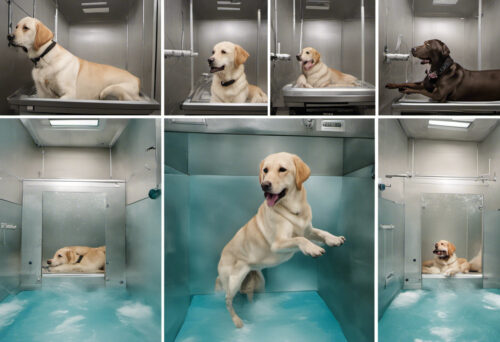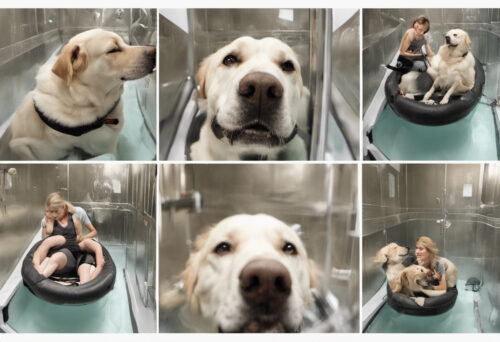Dogs are man’s best friend, companions who perceive and interact with the world uniquely through their keen senses. But what happens when one or more of these senses is deprived? In this article, we delve into the effects of sensory deprivation on a dog’s mental health, providing key insights from recent research and experts in the field.
Understanding Canine Sensory Perception
Before we delve into this heady concept, it’s important to understand how dogs perceive their surroundings. Dogs rely heavily on their powerful sense of smell, acute hearing, and sharp vision. Diminished access to sensory stimuli could have profound repercussions on their overall mental wellbeing.Sensory Deprivation in Dogs: What the Science Says
A recent deep dive into canine sensory deprivation has unveiled some fascinating insights.
The Impact on Mental Health
Canine sensory deprivation has significant implications for a dog’s mental condition. A docID study found that dogs who had sensory deprivation exhibited signs of stress and anxiety. Their findings align with previous research underlining the importance of sensory enrichment for canine psychological wellbeing.
Behavioral Changes
Behavioral modifications are another prevalent outcome of sensory deprivation. Dogs may become aloof, anxious, or aggressive due to the lack of sensory stimuli. Indeed, a 2018 paper indicates that sensory-deprived dogs are more prone to developing impulse-control disorders and aggressive behavior.
Types of Sensory Deprivation in Dogs
Sensory deprivation in dogs can come in various forms. Any loss or diminution of their sensory input, from hearing and seeing to smell or touch, can be considered a form of deprivation. Age, disease, or injury often causes these variations, leading to partial or total loss of sensory perception. For example, a dog that is blind, deaf, or has lost their sense of smell due to a nasal condition would experiences sensory deprivation.
Importance of Sensory Enrichment
Fostering an environment rich in sensory stimulation is therefore critical for a dog’s mental health. From routine walks around different scented locations to playtime with varied textured toys, sensory engagement can boost a dog’s mental stimulation, warding off anxiety and stress triggered by sensory deprivation.

The Simplicity of Sensory Stimulation
Creating a sensory enriched environment for your pup doesn’t necessarily mean you need an arsenal of cutting-edge toys or gadgets. Sometimes, the smallest changes in routine or space can make a difference. Studies, such as this one from the International Journal of Veterinary Science and Medicine, show how simple provisions like different textured balls, chew toys, or new scents can keep your dog stimulated and happy.
Implement Sounds
Sound offers a beneficial, under-used method of canine sensory enrichment. From the calming effect of classical music to the intrigue of novel nonsensical sounds, our beloved pets react and adjust based on the auditory stimuli they’re presented with.
Get Interactive with Scents
Given dogs’ powerful sense of smell, olfactory enrichment is key. A few drops of a new scent or a new location for walkies will give your dog a world of new smells to explore. This article from AVMA Journal explores the wonderful ways to stimulate dogs’ sense of smell.
Dogs with Sensory Deficits
For dogs with sensory deficits, some adjustments may be necessary. How can you tailor your pet’s lifestyle to enrich their remaining senses? Dogs facing deprivation of a particular sense, such as vision or smell, will naturally adjust by focusing more on their remaining senses. Whether it’s a rich array of textures for a blind pooch or providing auditory clues for a deaf dog, find inspiring ways to adapt to your furry friend’s needs in this ScienceDirect article.
Behavioural Therapy
According to experts at American Psychologist, behavioural modification therapies can also be an effective tool. The fostering of certain behaviours or habits might enable dogs dealing with sensory loss to better navigate their environments and reduce anxiety.
Final Thoughts
Sensory deprivation can have drastic consequences on canine mental health. Yet, with a bit of creativity and a commitment to enriching their sensory world, we can drastically mitigate these effects for our beloved pets. A sensory-rich environment provides both mental stimulation and psychological comfort, enhancing life for dogs with sensory loss. Remember, every smell, sound, or texture can be an exciting new adventure for your pet.

Adapting to Sensory Deficits
As an owner of a sensory-deprived dog, the responsibility often lies with you to help them adapt and navigate through their suddenly changed world. This Science Daily article explains how employing sensory cues and the use of their remaining senses can help a sensory-deprived dog retain confidence, while this piece from Journal of Applied Animal Welfare Science sheds light on the relevance of emergency training exercises.
Assistive Devices
Assistive devices can be particularly beneficial for dogs with sensory deficits. Muffin’s Halo, for instance, helps blind dogs navigate more easily. Or take auditory aids for dogs suffering from hearing loss as outlined in ScienceDirect.
Train and Reward
Training and rewarding your dog can be key to easing the effects of sensory deprivation. According to this piece from International Journal of Primatology, dogs respond best to positive reinforcement training, especially when coupled with their favourite treats or stimulating toys.
Consult a Professional
While adapting to a sensory-deprived lifestyle might seem challenging, assistance is readily available. Always consult a professional like your vet, a pet psychologist, or a trainer. This ScienceDirect article underscores the significance of seeking professional guidance when dealing with sensory-deprived dogs.
Support Groups
Consider joining support groups to share experiences and learn more from other pet owners facing the same challenges. This PubMed research shows how support groups can make the journey easier for both you and your furry friend.
In Conclusion
Sensory deprivation in dogs can drastically impact their mental well-being, but through love, care, and understanding, the effects can be significantly mitigated. It’s crucial to create a sensory-stimulating environment, adapt their lifestyle, and seek professional help if necessary. With patience and support, your dog can live a fulfilling and happy life, despite any sensory deficits. After all, our furry friends can teach us some of life’s greatest lessons: resilience, perseverance, and unbounding love.



